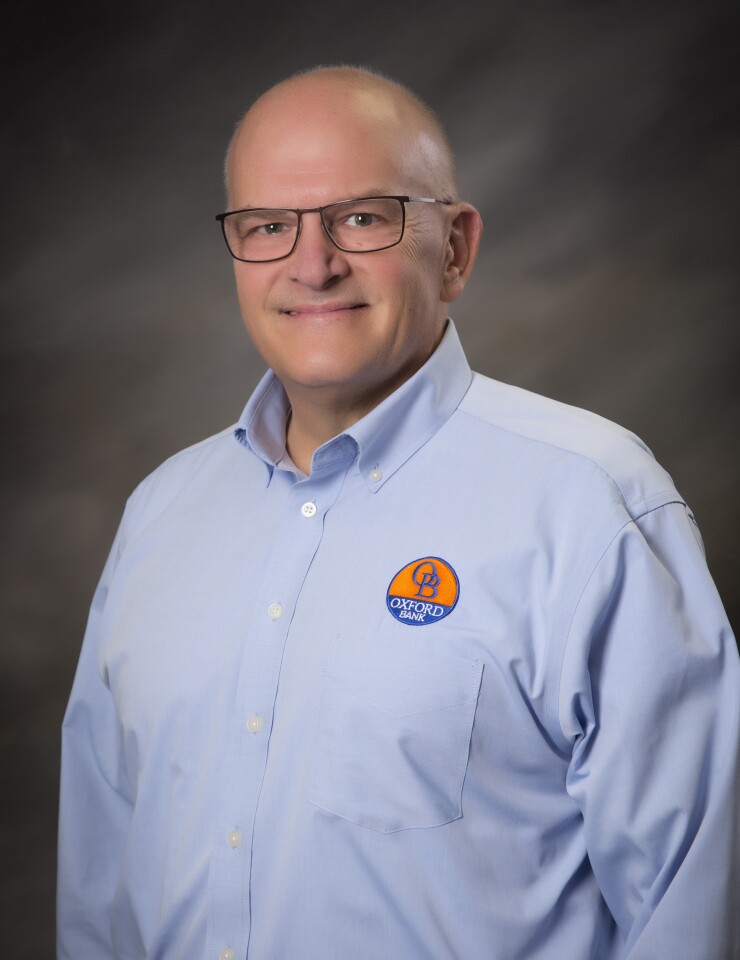
Like many community banks, Oxford Bank in Oxford, Michigan, played an outsize role in the Paycheck Protection Program. Its participation enabled Oxford, which made about 1,350 Paycheck Protection Program loans — 800 to customers outside the bank — to build a pipeline of what it termed "warm leads" that contributed significantly to its bottom line the past four years.
"That drove a lot of growth up until [2024]," President and CEO David Lamb said in an interview. "This is the year we can't rely on [PPP borrowers] for growth."
The $821 million-asset Oxford, which marked its 140th anniversary in June, saw net income more than double in recent years, from $5.4 million in 2019 to $12.6 million in 2023. Lamb, naturally, wants the momentum to continue. While he has no plans to tinker with Oxford's business model, focused on commercial-and-industrial lending, Lamb is weighing a move south, deeper into the metropolitan Detroit market.

"We would like to fill in metro Detroit," Lamb said. "We've really stayed to the north, and then we went out west" toward Ann Arbor. "I would like to cover the rest of metropolitan Detroit down to the border with Ohio, and potentially other adjoining states."
The fact Oxford is turning its gaze south "doesn't surprise me," Andrew Christians, a managing partner at the Detroit-based investment bank Donnelly Penman & Partners, said in an interview.
Just a handful of community banks — seven according to Federal Deposit Insurance Corp. statistics — are based in Oakland, Wayne and Macomb counties, the jurisdictions that make up the heart of Greater Detroit. "That's a big sandbox for local banks to play in," Christians said. "Oxford and others are positioned well given the general economic tenor of Detroit, of Michigan. I think they're in a good position to be successful."
A place to be
Earlier this year, the U.S. Census Bureau announced that Detroit saw its population increase by more than 2,000 people in 2023. As modest as that seems, the news made big headlines in Detroit. It marked the first official report of an annual population gain since 1955, midway through the Eisenhower administration.
Long considered the archetype of urban decay, Detroit actually led Michigan in total population growth in 2023, according to city officials. And as a growing number of people have beaten a path back to the city, its economic fortunes appear to have begun rebounding, too. A report released July 31 by the Detroit Regional Partnership pointed to growth in the region's gross domestic product, as well as expansion in median household income.
"Detroit proper [and] the Detroit metropolitan statistical area are growth markets for the first time in a long time," Christians said. "That's courtesy of the last 10 years of additional, quite substantial private investment going into the market [along with] diversification of industry and commerce."
Lamb isn't the only bank CEO interested in the Detroit area. Last month, the $2.6 billion-asset ChoiceOne Financial Services in Sparta, north of Grand Rapids,
Other banks, including the $53 billion-asset Old National Bancorp in Evansville, Indiana, and the $18 billion-asset First Merchants Corp. in Muncie, Indiana, have pursued a de novo route, opening branches in Troy, Old National, and in Detroit proper, First Merchants.
In January, JPMorgan Chase, the nation's largest bank, closed a $10 million, low-cost loan to Invest Detroit, a nonprofit that supports residential, commercial and retail development. The loan adds to the more than $200 million JPMorgan Chase has invested in Detroit since 2014.
Perhaps most encouragingly for Oxford, the Detroit region is adding new small and midsize businesses, more than 4,000 between 2012 and 2022, according to the Detroit Regional Chamber. The upward trend plays to what the bank sees as its commercial-and-industrial lending strong suit. At March 31, C&I loans made up 25% of the privately held Oxford's $556 million loan portfolio, according to Federal Deposit Insurance Corp. statistics. "We've always been very focused on C&I lending. That's what we like to do," Lamb said.
Playing to its strengths
Community banks like his, Lamb argues, have a competitive leg up with smaller businesses. "We still [make] the majority of small-business loans," Lamb said. "We have a real advantage there, over the large competitors, who really have focused on tech-only strategies. A lot of small-to-midsize businesses need more than a tech strategy to do what they're doing. … People really do want relationships."
It wouldn't take a huge effort for Oxford to make the economics of a metropolitan Detroit expansion work, Lamb said. "We only have to scrape a very few percentage points" from other lenders. "If we could take 1% we would be so much bigger than we are," Lamb said.
Deposits appear to present the biggest headwind to Oxford's growth plans. "We can produce a lot of good credit-quality loans," Lamb said. "You're going to always grow loans faster than deposits." To keep things in balance, Oxford requires new lending clients to move their primary deposit relationships. "We've always been very, very disciplined about requiring deposits with our loans."
The practice has paid off, to a degree. Oxford produced a net interest margin of 5.06% during the first six months of 2024, eight basis points above NIM it reported for the first half of 2023. At the same time, total deposits fell 3% to $694 million in the 12 months ending June 30.
Detroit is one area on Oxford's radar screen. "We've actually had a lot of people move here from the East Coast," Lamb said. "We're right on a river. We're right across from Canada. It's beautiful. We want to go down there. We're just trying to figure out when."






